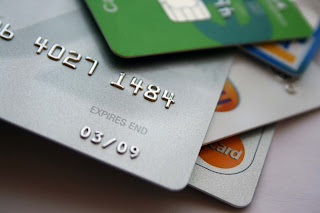Monday, June 29, 2009
Keeping Perspective
Friday, June 26, 2009
Spending Habits: Needs vs. Wants
 Another excerpt from "Developing Discipline in Spending:"
Another excerpt from "Developing Discipline in Spending:""One of the best financial lessons we can ever learn is the difference between needs and wants. The agreed upon needs of humanity our simple: food, clothing, and shelter. Does that mean caviar, high-fashion one-of-a-kind outfits, and million dollar penthouses? Of course the answer is no. Most of us can easily see past that exaggerated example. But when it comes to less obvious questions, although in theory we may know the answer, in practice we all too often rationalize unsound choices.
(Image from morato777 on Stock.Xchng)
Thursday, June 25, 2009
Developing Discipline in Spending
 Here's an excerpt from "Developing Discipline in Spending."
Here's an excerpt from "Developing Discipline in Spending.""We know we should cut expenses, we know we should save--we know, we know...blah, blah, blah. But do we do it? Maybe yes, maybe no. For those of us who answered no, I think what largely dictates our spending is our psychological relationships with money. Perhaps we subconsciously think that buying more will bring happiness by filling some void we have. Perhaps we value being able to keep up with the Jones', whether we financially can or not. Maybe we despise money and are unwilling to let it rule our lives so we consequently do little planning ahead and end up even spending more. Or maybe we're just lazy. Although knowing why you have trouble limiting spending is helpful in eliminating the problem, the end result is the same regardless of what particular element you're ailing from: undisciplined spending leads to financial uncertainty and bleak futures."
(Image from robtostes on Stock.Xchng)
Wednesday, June 24, 2009
"Economic Survival Tips" from Donald Trump

"Is your life half empty or half full? Half is better than zip. Count your blessings."
"Realize that fear is the exact opposite of faith."
"Resolve to be bigger than your problems. Who’s the boss?"
"Don’t negate your own power. Whatever you’ve been dealt, know you can deal with it."
Getting Out of Debt with a Debt-Elimination Calendar
"How to begin today the process of paying off creditors and getting out of debt using a debt-elimination calendar as explained by Marvin J. Ashton."
Tuesday, June 23, 2009
Couples Finance: "We Can't Afford It"
 In Robert D. Hales' speech "Becoming Provident Providers Temporally and Spiritually," he addresses the notion that couples have to spend on one another. He shares two provident living lessons he has learned with the help of his wife, the first story having been inserted below.
In Robert D. Hales' speech "Becoming Provident Providers Temporally and Spiritually," he addresses the notion that couples have to spend on one another. He shares two provident living lessons he has learned with the help of his wife, the first story having been inserted below.Monday, June 22, 2009
Financial Fitness Quiz
What I found most helpful is that based on your answers, the results of your test give tailored suggestions for improvement with embedded links providing further explanations. The test also requires answering some mandatory demographic questions for research purposes, but no identifying information is collected.
Give the Financial Fitness Quiz a try for help in identifying where some personal weak spots are in your present managing of finances.
Saturday, June 20, 2009
Teaching Kids about Finance
 In Marvin J. Ashton's Guide to Family Finance, three of the twelve principles he lists in order to achieve improved personal and family financial management talk specifically about teaching children--teaching children about money, working and contributing. Here are his recommendations.
In Marvin J. Ashton's Guide to Family Finance, three of the twelve principles he lists in order to achieve improved personal and family financial management talk specifically about teaching children--teaching children about money, working and contributing. Here are his recommendations.Friday, June 19, 2009
Debt-Elimination Calendar
"A debt-elimination calendar can help you reduce or eliminate unnecessary debt. Mark off several columns on a piece of paper. In the first column on the left, write the names of the months, beginning with the upcoming month. At the top of the next column, write the name of the creditor you want to pay off first. It may be the debt with the highest interest rate or the earliest pay-off date. List the monthly payment for that creditor until the loan is repaid as shown in the illustration at right. At the top of the next column, record the name of the second creditor you want to repay, and list payments due each month. After you have repaid the first creditor, add the amount of that monthly payment to your payment to the second creditor. Continue the process until all loans are repaid."
To see a debt-elimination calendar sample, you can visit Elder Marvin J. Ashton's Guide to Family Finance and scroll down to the bottom.
Getting Out of Debt
President Gordon B. Hinckley (as First Counselor in the First Presidency of the Church of Jesus Christ of Latter-day Saints) shared this in March 1990, quoting from 1938, but it's just as applicable today--to people of faith and not of faith alike.
"Back in 1938, I heard President J. Reuben Clark, Jr., speaking from the Tabernacle pulpit, talk about interest. He said:
'Interest never sleeps nor sickens nor dies; it never goes to the hospital; it works on Sundays and holidays; it never takes a vacation; it never visits nor travels; it takes no pleasure; it is never laid off work nor discharged from employment; it never works on reduced hours; it never has short crops nor droughts; it never pays taxes; it buys no food; it wears no clothes; it is unhoused and without home and so has no repairs, no replacements, no shingling, plumbing, painting, or whitewashing; it has neither wife, children, father, mother, nor kinfolk to watch over and care for; it has no expense of living; it has neither weddings nor births nor deaths; it has no love, no sympathy; it is as hard and soulless as a granite cliff. Once in debt, interest is your companion every minute of the day and night; you cannot shun it or slip away from it; you cannot dismiss it; it yields neither to entreaties, demands, or orders; and whenever you get in its way or cross its course or fail to meet its demands, it crushes you.'"
Thursday, June 18, 2009
Free Materials from Practical Money Skills
Some of the free items offered:
Practical Money Skills at Home CD-ROM
"The calculators and games on Practical Money Skills At Home CD-ROM make learning financial management skills easy and fun:
Games
Cash Puzzler, Ed's Bank, Financial Football (standard), Financial Football (advanced), Countdown to Retirement, Road Trip to Savings and The Smart Money Quiz Show
Calculators
Save a Million, Rework Budget, Retirement, Cost of Credit, Cost of Loans, Auto Loan, Save for College, Entertainment Planner, Gift Log, Holidays, Mortgage, Back to School Budgeting and Travel Calculator"
Practical Money Guides: Complete Set
"Covering everything from credit cards to budget basics to the ins and outs of a credit history, these brochures educate consumers on the key issues of financial responsibility."
Practical Money Guide: Budget Basics
"A budget can help you pay your bills on time, cover unexpected emergencies, and reach your financial goals now and in the future. Most of the information you need for your budget is already at your fingertips. This guide explains how to create a budget and stick to it."
Practical Money Guide: Credit Card Basics
"Credit cards can be powerful financial tools for you and your family, and as with all financial tools, they need to be used carefully. This guide outlines the basics of credit cards and the responsible use of credit."
Practical Money Guide: Credit History
"To get a glimpse of your financial future, many businesses look at your financial past. This history is contained in your credit report. Your credit report determines everything from qualifying for a loan, the rate you'll pay on that loan, getting a new job, renting an apartment and obtaining car insurance. This guide explains what credit bureaus are, why your credit history matters, and how to correct credit report errors and keep your credit rating strong."
Practical Money Guide: Debit Card Basics
"If credit cards mean 'pay later,' debit cards mean 'pay now.' These cards are tied to your bank account and are like paying with cash. With debit cards, you've got to have the money in the bank to cover your purchases. These cards look similar to credit cards so make sure you know what type of card your financial institution issued you."
Practical Money Guide: Identity Theft
"When your personal financial information gets into the wrong hands, the consequences can be devastating. It's critical to understand how identity theft and card fraud can happen to you. The information provided here will help you avoid becoming a victim and tell you what you can do if your identity is stolen."
Wednesday, June 17, 2009
Talking About Finances with your Partner
 "Getting on the Same Financial Page" is an article I wrote, published by wedding planning company Anxiously Engaged, for--you guessed it--engaged people. :)
"Getting on the Same Financial Page" is an article I wrote, published by wedding planning company Anxiously Engaged, for--you guessed it--engaged people. :)But, I think it also applies to people who are married and to people who are interested in ever getting married or having a significant other. Every couple should have an open dialogue about family finances, and here's a guide in getting there.
"You’ve found the man or woman of your dreams. You’re in love. You’re about to get married. Why should you waste time talking about finances now; there will be plenty of time for that later, right? Wrong! Although money is not explicitly the primary reason for most divorces, it is undoubtedly a recurring factor among them. Money, whether you have a little or a lot, is a potential hotbed for disagreement, contention, and discord.
"So what solves the problem? That you’re both frugal? No. That you’re both rich? No. That you’re both willing to eradicate your lives of all types of currency and primitively live off the land without any contact from the outside world? Well, maybe. But an easier approach would be to just communicate. . . ."
Continue reading "Getting on the Same Page."
(Image from nookiez on Stock.Xchng)
Tuesday, June 16, 2009
Creating a Holographic Will
"Depending on your estate, you will obviously want to include different directions in your holographic will. But in general, the following terms are included . . . "
What Should I Do Now?
"Keep your holographic will in a safe place and notify your executor where you have placed your will. Be sure to update your holographic will if your circumstances become different and any changes need to be made. . . ."
Monday, June 15, 2009
What You Need to Know About Holographic Wills
 If you have kids, you should have a will. If you have a spouse, you should have a will. If you have a complicated background (i.e., like a former spouse), you should have a will. If you have any real sort of property or estate, you should have a will.
If you have kids, you should have a will. If you have a spouse, you should have a will. If you have a complicated background (i.e., like a former spouse), you should have a will. If you have any real sort of property or estate, you should have a will.Saturday, June 13, 2009
What's in a Budget
 A budget is made up of three major sections: income, expenses, and savings. All sources of income should be added and totaled making sure to subtract applicable taxes. Expenses should then be listed as line items, generally divided into two categories: fixed and variable.
A budget is made up of three major sections: income, expenses, and savings. All sources of income should be added and totaled making sure to subtract applicable taxes. Expenses should then be listed as line items, generally divided into two categories: fixed and variable.Variable expenses also might include payments we don't want to make, but the amounts designated to those categories are more in our control, hence the title "variable." Food's a must, but how much we spend each month is more up to us than how much we spend on rent, in the short run, so food goes under variable expenses.
Friday, June 12, 2009
What a Budget Can Do For You
 As the last post introduces, budgets give financial direction. When you begin analyzing expenditures and isolating where your money is going, it becomes much easier to see where you can cut costs and minimize waste.
As the last post introduces, budgets give financial direction. When you begin analyzing expenditures and isolating where your money is going, it becomes much easier to see where you can cut costs and minimize waste.More often than not, we don't realize how much we are spending until we studiously record and monitor all the financial activities we have going on in our busy and hectic lives. Whether we are wealthy or not, wasting money—obviously—isn't in our best interest.
Proper budgeting is what gives us the ability to minimize costs and optimize our financial circumstances, not to mention what it can do in building self-discipline and self-respect.
Tune in tomorrow for specific suggestions on what's in a budget!
(Image from dhester on Stock.Xchng)
An Introduction to Budgeting
 Financial planners might disagree when it comes to certain topics, but I know of no one that will tell you to go without a budget. A solid budget, when adhered to, is the foundation of a successful financial household. Budgets are what make and break individuals and businesses alike.
Financial planners might disagree when it comes to certain topics, but I know of no one that will tell you to go without a budget. A solid budget, when adhered to, is the foundation of a successful financial household. Budgets are what make and break individuals and businesses alike.Thursday, June 11, 2009
Saving Money: How to Get Free Samples Without All the Spam
 Recently I wrote about how signing up for free samples and coupons is a great way to save money. Here's a follow-up post about how to do so carefully in order to minimize spam and other unwanted interactions.
Recently I wrote about how signing up for free samples and coupons is a great way to save money. Here's a follow-up post about how to do so carefully in order to minimize spam and other unwanted interactions.Wednesday, June 10, 2009
Protecting Against Identity Theft in Three Parts: #3
 Identity theft, the stealing of someone's personal or private information, can happen to all of us, regardless of how cautious and conservative we are with our personal information. However, taking certain precautions will greatly decrease our chances of falling victim to such a painful and distressing crime.
Identity theft, the stealing of someone's personal or private information, can happen to all of us, regardless of how cautious and conservative we are with our personal information. However, taking certain precautions will greatly decrease our chances of falling victim to such a painful and distressing crime.Tuesday, June 9, 2009
Protecting Against Identity Theft in Three Parts: #2
 Identity theft, the stealing of someone's personal or private information, can happen to all of us, regardless of how cautious and conservative we are with our personal information. However, taking certain precautions will greatly decrease our chances of falling victim to such a painful and distressing crime.
Identity theft, the stealing of someone's personal or private information, can happen to all of us, regardless of how cautious and conservative we are with our personal information. However, taking certain precautions will greatly decrease our chances of falling victim to such a painful and distressing crime.2. Vary the Information You Divulge
The principle of storing the financial documents of various accounts separate to minimize damage is most effective when separate accounts actually have varied personal information. No, I'm not talking about using a different name and birth date. How many of us use the same username and password for everything? And the same security questions and answers?
In order to protect our accounts, we should be varying the information we use for each one. This way, even if someone knows how to break into our credit card account, he or she would have an extremely hard time accessing another account without extra information.
Tune in tomorrow for Part 3. Again, if you can't wait, you can read the rest of the article here. :)
(Image from Forwardcom on Stock.Xchng)
Monday, June 8, 2009
Protecting Against Identity Theft in Three Parts: #1
 Identity theft, the stealing of someone's personal or private information, can happen to all of us, regardless of how cautious and conservative we are with our personal information. However, taking certain precautions will greatly decrease our chances of falling victim to such a painful and distressing crime.
Identity theft, the stealing of someone's personal or private information, can happen to all of us, regardless of how cautious and conservative we are with our personal information. However, taking certain precautions will greatly decrease our chances of falling victim to such a painful and distressing crime.Saturday, June 6, 2009
Combating Unemployment
 I recently wrote an article published on Associated Content entitled "What to Do in Times of Unemployment" detailing three general avenues many successfully pursue during times of unemployment.
I recently wrote an article published on Associated Content entitled "What to Do in Times of Unemployment" detailing three general avenues many successfully pursue during times of unemployment."We all hit rough financial times here and there, especially in these trying days of global economic uncertainty. When pitfalls occur—and they will—it's important to maintain hope and to optimize the unpleasant circumstances we're faced with. Regardless of our specific situations, we all have things to still be grateful for and opportunities to still pursue. Although finding the best route for you to follow will, of course, depend on your particular scenario, here are three general avenues many successfully pursue during times of unemployment.
Part-Time and Freelance Work
"When you can't find full-time work, look for part-time work in the mean time. It's a simple concept that works for many in the in-between time of having full employment. But, because so many are currently unemployed or underemployed, even part-time work can be challenging to find. It's important to be humble and realistic. Having an elitist attitude about what work is beneath you will surely result in a less productive job search. Of course there are jobs we really don't want to take, and we don't have to. But there are other jobs that are only marginally less than favorable, and it's for those offers that we should be open and flexible.
"When we can't find part-time employment, engaging in freelance work can often produce means to get by, or at the very least, means to get by better. A paycheck is a paycheck—it's still going to help. Freelance work such as writing, participating in market research, and operating call centers certainly may not result in the best pay ever, but it's something to live off of while still looking for other work. . . ."
Continue reading the article for the next two sections on Education and Volunteering.
(Image from Bubbels on Stock.Xchng)
Friday, June 5, 2009
Rebuilding Your Credit Score
 By optimizing these indicators, your credit score will increase:
By optimizing these indicators, your credit score will increase:1. Payment History
2. Ratio of Credit Limit to Actual Debt
3. Length of Credit History
4. Types of Credit Used
5. Past Credit Applications
(Image from M0php on Stock.Xchng)
Thursday, June 4, 2009
Checking Your Credit Report
 Credit reports contain your credit history as recorded by credit bureaus. In the United States, you are entitled to a free credit report from each of the three major bureaus every 12 months.
Credit reports contain your credit history as recorded by credit bureaus. In the United States, you are entitled to a free credit report from each of the three major bureaus every 12 months.That means every four months, you should be checking your report with one of the agencies to make sure your history is being reported accurately. Credit reports are what determine your credit score.
Checking your report, consequently, is a free way to keep on top of how lenders see you. Go to https://www.annualcreditreport.com to retrieve your credit reports from the three major bureaus: Experian, TransUnion, and Equifax.
(Image from Frencenz on Stock.Xchng)
Wednesday, June 3, 2009
Saving Money with Free Samples and Coupons
 One of the easiest ways to save money is to take advantage of the great deals that are abundantly, and freely, available.
One of the easiest ways to save money is to take advantage of the great deals that are abundantly, and freely, available.Below is a link to an article I penned reviewing five free sample sites and the pros and cons of each, one of which is my own blogspot--We Love Free Samples. Here's my open take on my own site, and you can click on the article link for details on the other four sites.
"We Love Free Samples may be a simple blogspot, but it is updated constantly with the best offers from every other free samples site I have seen. Because sample links are double checked (and by a human), very few—if any—spam offers make their way into the site's offerings.
"Pros: The site is best at providing links for tried and true offers. If you want to make sure that you're requesting samples only from the most reliable venues, We Love Free Samples is likely your kind of site. The posts are always straightforward, giving you the directions you need and saving you from the nonsense that you don't.
"Cons: Only conservative offers are posted. If you don't like to play it safe, then We Love Free Samples may not be for you. If you want to chance getting those high-risk, high-return samples, then you will probably want to check out the other free sample sites in addition to just this one."
Continue reading The Best Online Resources for Free Samples and Coupons.
(Image from Woodsy on Stock.Xchng)
Tracking Your Finances
 I use the software Quicken to manage my personal finances. Before I had Quicken, I just used Excel. The software isn't as important as your personal commitment in being a disciplined financial manager. No software in the world will take care of everything on its own.
I use the software Quicken to manage my personal finances. Before I had Quicken, I just used Excel. The software isn't as important as your personal commitment in being a disciplined financial manager. No software in the world will take care of everything on its own.Even if you have online bill pay, automatic account downloads, and any other frill and thrill you can imagine, if you aren't ever going to open the program, you're still going to have a mess on your hands.
Start small, then work up. Build some discipline with free or low-cost programs instead of thinking that a high-priced software program will take care of itself. Maybe try Quicken's free and simple online version before shelling out $60 for the Deluxe edition.
(Image from KillR-B on Stock.Xchng)
Creating a Personal Balance Sheet
 Creating a Personal Balance Sheet will help you identify, financially, where you are now and what it will take to get to the place you want to be.
Creating a Personal Balance Sheet will help you identify, financially, where you are now and what it will take to get to the place you want to be.Balance Sheets account for everything you own (assets) and everything you owe (liabilities). And you only have to use one easy formula. Think Aloe Vera. A = L + OE. The sum of all your assets are equal to the combination of the sum of all your liabilities and "Owner's Equity," which in the case of households, is termed "Net Worth." (But the formula A = L + NW is clearly less catchy. Hence, everyone still remembers "ALOE" anyway.)
Directions: Get a piece of paper. List all of your assets on the left. Then all of your liabilities on the right. The difference between assets and liabilities is net worth. Calculate your net worth.
So what does it mean?
If you own everything on credit, you're going to have a small net worth. If you have no debt and a lot of property and possessions, you're going to have a high net worth.
Minimizing debt and (wisely) increasing assets lead to a healthy financial future.
(Image from Miamiamia on Stock.Xchng)
Welcome!
I graduated in business management from Brigham Young University's Marriott School of Management. I've studied financial basics extensively, from both corporate and personal standpoints, and hope I can share some of what I have learned.
Let me know if you have any questions! And thanks for stopping by!






